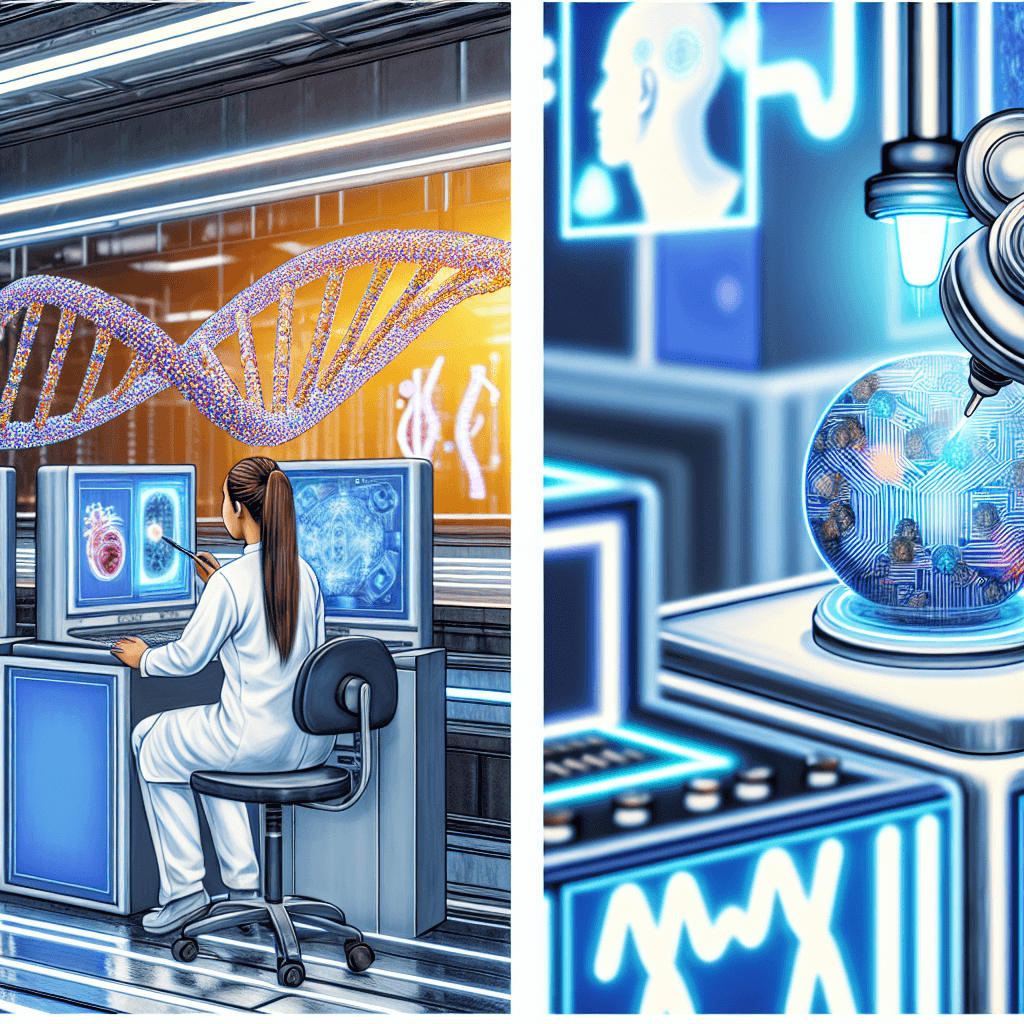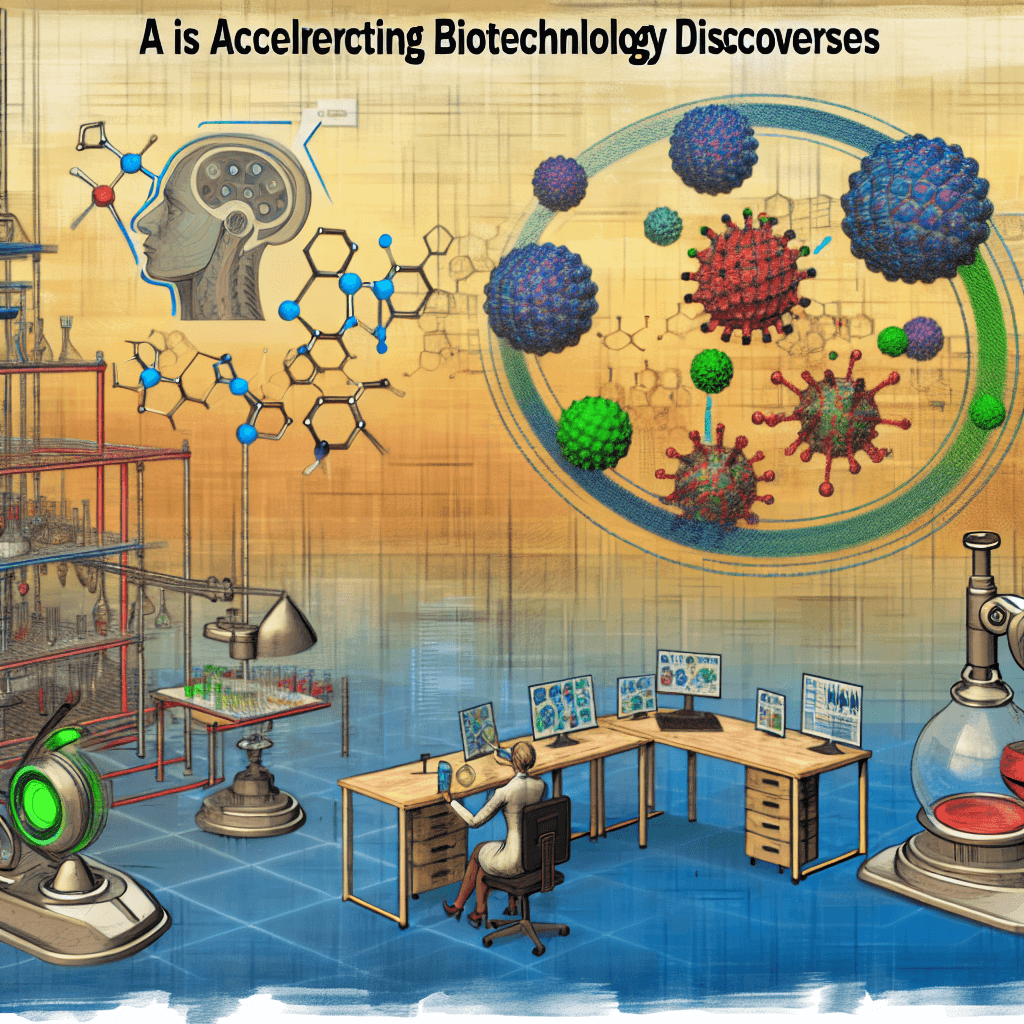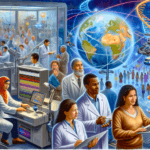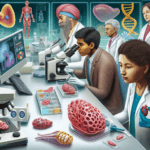“Explore the powerful impact of AI on biotechnology research and breakthroughs, revolutionizing the way we understand and treat diseases. #AI #biotech”
How AI is Accelerating Biotechnology Discoveries

Table of Contents
“Unleashing the power of AI to revolutionize biotechnology breakthroughs.”
Introduction
Artificial intelligence (AI) has been rapidly advancing in recent years, revolutionizing various industries and fields. One area where AI is making a significant impact is in biotechnology. With its ability to analyze vast amounts of data and make predictions, AI is accelerating biotechnology discoveries at an unprecedented rate. In this introduction, we will explore how AI is transforming the biotechnology industry and the potential it holds for future breakthroughs.
The Role of AI in Drug Discovery and Development
The field of biotechnology has been rapidly advancing in recent years, thanks in part to the integration of artificial intelligence (AI) technology. AI has revolutionized the way drug discovery and development is conducted, allowing for faster and more accurate results. This has led to an acceleration of biotechnology discoveries, with the potential to greatly impact the healthcare industry.
One of the key roles of AI in drug discovery and development is its ability to analyze vast amounts of data in a fraction of the time it would take a human. This is particularly useful in the early stages of drug development, where researchers must sift through large databases of chemical compounds to identify potential candidates for further testing. With AI, this process can be completed in a matter of hours, compared to the weeks or even months it would take a human to manually analyze the same data.
Furthermore, AI has the ability to identify patterns and relationships within the data that may not be apparent to humans. This allows for a more comprehensive analysis of potential drug candidates, increasing the chances of finding a successful treatment. In addition, AI can also predict the effectiveness of a drug based on its chemical structure, saving time and resources by eliminating the need for extensive laboratory testing.
Another important role of AI in drug discovery and development is its ability to assist in the design of clinical trials. AI algorithms can analyze patient data and identify specific characteristics that may affect the outcome of a trial. This allows for more targeted and efficient trials, reducing the time and cost associated with traditional trial design methods. Additionally, AI can also help identify potential safety concerns or adverse reactions to a drug, allowing for adjustments to be made before the trial begins.
In addition to its role in drug discovery and development, AI is also being utilized in the manufacturing process of biotechnology products. With the use of AI, manufacturers can optimize production processes, ensuring a consistent and high-quality product. This is particularly important in the production of biologics, which are complex molecules that require precise manufacturing techniques. By using AI, manufacturers can reduce the risk of errors and improve the overall efficiency of the production process.
Furthermore, AI is also being used in the analysis of patient data to identify potential biomarkers for diseases. This allows for earlier detection and diagnosis of diseases, leading to more effective treatments. In addition, AI can also assist in the development of personalized medicine, where treatments are tailored to an individual’s genetic makeup. This has the potential to greatly improve patient outcomes and reduce the risk of adverse reactions to medications.
The integration of AI in biotechnology has also led to the development of new technologies, such as machine learning and deep learning. These technologies allow for the creation of predictive models that can analyze large datasets and make accurate predictions. This has the potential to greatly impact drug discovery and development, as well as other areas of biotechnology research.
However, it is important to note that AI is not meant to replace human researchers and scientists. Rather, it is meant to enhance their capabilities and assist in the discovery and development process. Human expertise and creativity are still crucial in the field of biotechnology, and AI can help researchers focus their efforts on the most promising areas.
In conclusion, the role of AI in drug discovery and development is crucial in accelerating biotechnology discoveries. Its ability to analyze vast amounts of data, identify patterns and relationships, and assist in clinical trial design has greatly improved the efficiency and effectiveness of the drug development process. As AI technology continues to advance, we can expect to see even more significant contributions to the field of biotechnology, ultimately leading to improved healthcare outcomes for patients worldwide.
Using Machine Learning to Predict Protein Structures

The field of biotechnology has seen tremendous growth and advancements in recent years, thanks to the integration of artificial intelligence (AI) and machine learning (ML) technologies. These technologies have revolutionized the way scientists approach research and development, particularly in the area of predicting protein structures.
Proteins are essential molecules that play a crucial role in various biological processes, such as metabolism, cell signaling, and immune response. Understanding their structures is vital in developing new drugs, vaccines, and other biotechnological products. However, determining the structure of a protein is a complex and time-consuming process that requires extensive experimentation and analysis.
This is where AI and ML come in. By utilizing these technologies, scientists can now predict protein structures with greater accuracy and efficiency, significantly accelerating the pace of biotechnology discoveries.
One of the primary ways AI is used in predicting protein structures is through deep learning algorithms. These algorithms are trained on vast amounts of data, including known protein structures, to learn patterns and relationships between amino acids, the building blocks of proteins. This allows the algorithm to make predictions about the structure of a protein based on its amino acid sequence.
One of the key advantages of using deep learning algorithms is their ability to handle large and complex datasets. This is crucial in the field of biotechnology, where the number of known protein structures is constantly increasing. With the help of AI, scientists can analyze and make predictions on these vast datasets in a fraction of the time it would take using traditional methods.
Another significant benefit of using AI in predicting protein structures is its ability to learn and improve over time. As more data becomes available, the algorithm can continuously refine its predictions, leading to even more accurate results. This is a crucial aspect in the ever-evolving field of biotechnology, where new proteins and their structures are constantly being discovered.
In addition to deep learning algorithms, AI is also used in other techniques for predicting protein structures, such as homology modeling and ab initio modeling. Homology modeling involves using known protein structures as templates to predict the structure of a similar protein. AI can assist in this process by identifying the most suitable template and making adjustments to improve the accuracy of the prediction.
Ab initio modeling, on the other hand, involves predicting the structure of a protein solely based on its amino acid sequence, without using any known templates. This is a challenging task, but with the help of AI, scientists can now make more accurate predictions, even for proteins with no known structures.
One of the most significant breakthroughs in using AI for predicting protein structures came in 2018 when Google’s DeepMind team developed AlphaFold, a deep learning algorithm that can predict protein structures with remarkable accuracy. In a recent competition, AlphaFold outperformed all other methods, including those developed by leading research groups, in predicting the structures of proteins with no known structures.
The impact of AI in predicting protein structures goes beyond just accelerating the pace of biotechnology discoveries. It also has the potential to significantly reduce the cost of research and development. Traditional methods of determining protein structures involve expensive and time-consuming experiments, which can be a barrier for smaller research groups or companies. With AI, these costs can be significantly reduced, making it more accessible for all researchers to utilize this technology.
In conclusion, the integration of AI and ML technologies in predicting protein structures has revolutionized the field of biotechnology. It has not only accelerated the pace of discoveries but also made it more accessible and cost-effective. As these technologies continue to advance, we can expect even more significant breakthroughs in the field of biotechnology, leading to the development of new and innovative products that can improve human health and well-being.
Enhancing Precision Medicine with Artificial Intelligence
Artificial intelligence (AI) has been making waves in various industries, and biotechnology is no exception. With its ability to analyze vast amounts of data and identify patterns, AI is revolutionizing the field of precision medicine. This emerging technology is accelerating biotechnology discoveries and paving the way for more personalized and effective treatments.
Precision medicine, also known as personalized medicine, is an approach that takes into account an individual’s genetic makeup, lifestyle, and environment to tailor medical treatments. This approach has shown promising results in treating diseases such as cancer, where each patient’s tumor is unique and requires a personalized treatment plan. However, the success of precision medicine relies heavily on the ability to analyze and interpret large amounts of data, which is where AI comes in.
One of the key ways AI is enhancing precision medicine is through its ability to analyze genomic data. Genomics is the study of an individual’s genetic makeup, and it plays a crucial role in precision medicine. With the help of AI, researchers can analyze vast amounts of genomic data and identify patterns that can lead to the discovery of new treatments or personalized therapies for patients.
AI is also being used to analyze medical images, such as MRI scans and X-rays, to aid in the diagnosis and treatment of diseases. These images contain a wealth of information that can be difficult for a human to interpret accurately. However, AI algorithms can analyze these images and identify subtle patterns or abnormalities that may not be visible to the human eye. This can lead to earlier and more accurate diagnoses, allowing for more effective treatment plans.
In addition to analyzing data, AI is also being used to develop new drugs and treatments. Traditional drug discovery methods can be time-consuming and costly, with a high failure rate. However, with the help of AI, researchers can analyze vast amounts of data and identify potential drug candidates much faster. This not only speeds up the drug discovery process but also reduces costs, making it more accessible for smaller biotech companies to develop new treatments.
Moreover, AI is also being used to identify potential side effects of drugs. By analyzing data from clinical trials and real-world patient data, AI algorithms can identify patterns and predict potential side effects of a drug. This can help researchers make more informed decisions about which drugs to pursue and can also aid in the development of safer and more effective treatments.
Another area where AI is making a significant impact is in clinical trials. These trials are essential for testing the safety and efficacy of new treatments before they can be approved for use. However, recruiting participants for these trials can be a lengthy and challenging process. With the help of AI, researchers can analyze patient data and identify potential candidates who may be suitable for a particular trial. This not only speeds up the recruitment process but also ensures that the trial includes a diverse group of participants, leading to more accurate and reliable results.
Furthermore, AI is also being used to develop personalized treatment plans for patients. By analyzing a patient’s medical history, genetic data, and lifestyle factors, AI algorithms can identify the most effective treatment options for that individual. This can lead to more targeted and personalized treatments, resulting in better outcomes for patients.
In conclusion, AI is playing a crucial role in accelerating biotechnology discoveries and enhancing precision medicine. Its ability to analyze vast amounts of data, identify patterns, and develop personalized treatment plans is revolutionizing the field of medicine. As AI technology continues to advance, we can expect to see even more significant breakthroughs in precision medicine, leading to better and more personalized treatments for patients.
AI-Powered Genomics: Advancements in DNA Sequencing and Analysis
The field of biotechnology has been rapidly advancing in recent years, thanks in large part to the integration of artificial intelligence (AI) technology. AI has revolutionized the way we approach various aspects of biotechnology, from drug discovery to genetic engineering. One area where AI has made a significant impact is in genomics, specifically in the field of DNA sequencing and analysis.
DNA sequencing is the process of determining the precise order of nucleotides in a DNA molecule. This information is crucial for understanding the genetic makeup of an organism and can provide valuable insights into disease susceptibility, drug response, and other important factors. However, traditional DNA sequencing methods are time-consuming and expensive, making it difficult to analyze large amounts of genetic data.
This is where AI-powered genomics comes in. By utilizing machine learning algorithms, AI can analyze vast amounts of genetic data in a fraction of the time it would take a human to do so. This has greatly accelerated the pace of genetic research and has opened up new possibilities for biotechnology discoveries.
One of the key advancements in AI-powered genomics is the development of next-generation sequencing (NGS) technologies. NGS allows for the rapid sequencing of large amounts of DNA, making it possible to analyze entire genomes in a matter of days. This has greatly expanded our understanding of the genetic basis of diseases and has led to the discovery of new genetic markers and potential drug targets.
In addition to speeding up the sequencing process, AI has also improved the accuracy and reliability of DNA analysis. Traditional methods of DNA analysis rely on human interpretation, which can be prone to errors and inconsistencies. AI algorithms, on the other hand, can analyze genetic data with a high level of precision and consistency, reducing the risk of errors and providing more reliable results.
One of the most significant applications of AI-powered genomics is in the field of personalized medicine. By analyzing an individual’s genetic data, AI can identify potential disease risks and tailor treatment plans accordingly. This has the potential to greatly improve patient outcomes and reduce healthcare costs by targeting treatments to those who are most likely to benefit from them.
Another area where AI is making a significant impact is in the field of synthetic biology. Synthetic biology involves the design and construction of new biological systems or the modification of existing ones for specific purposes. AI can assist in this process by analyzing genetic data and identifying potential genetic modifications that could lead to desired outcomes. This has the potential to greatly accelerate the development of new drugs, vaccines, and other biotechnology products.
AI is also being used to improve our understanding of the human microbiome, the collection of microorganisms that live in and on our bodies. By analyzing the genetic data of these microorganisms, AI can identify potential links between the microbiome and various health conditions. This has the potential to lead to new treatments and therapies for a wide range of diseases.
However, as with any technology, there are also challenges and limitations to consider. One of the main concerns with AI-powered genomics is the potential for bias in the data and algorithms used. This could lead to inaccurate or biased results, which could have serious implications for patient care. It is crucial for researchers and developers to address these concerns and ensure that AI is used ethically and responsibly in the field of genomics.
In conclusion, AI-powered genomics is revolutionizing the field of biotechnology and accelerating the pace of discoveries. From faster and more accurate DNA sequencing to personalized medicine and synthetic biology, AI is playing a crucial role in advancing our understanding of genetics and its applications in healthcare. As technology continues to evolve, we can expect even more exciting developments in the field of AI-powered genomics and its impact on biotechnology.
Q&A
1. How is AI being used in biotechnology?
AI is being used in biotechnology to analyze large amounts of data and identify patterns and relationships that would be difficult for humans to detect. This allows for more efficient and accurate drug discovery, disease diagnosis, and genetic research.
2. What are some specific examples of AI in biotechnology?
Some specific examples of AI in biotechnology include using machine learning algorithms to analyze genetic data and identify potential drug targets, using natural language processing to extract information from scientific literature, and using computer vision to analyze images of cells and tissues for disease diagnosis.
3. How is AI accelerating biotechnology discoveries?
AI is accelerating biotechnology discoveries by streamlining the research process and allowing for more efficient analysis of large datasets. This can lead to faster identification of potential drug targets, more accurate disease diagnosis, and a deeper understanding of genetic mechanisms.
4. What are the potential benefits of using AI in biotechnology?
The potential benefits of using AI in biotechnology include faster and more accurate drug discovery, improved disease diagnosis and treatment, and a better understanding of genetic mechanisms. This can ultimately lead to the development of new and more effective treatments for diseases and improved overall healthcare outcomes. Additionally, AI can help reduce costs and increase efficiency in the biotechnology industry.
Conclusion
In conclusion, AI is playing a crucial role in accelerating biotechnology discoveries. With its ability to analyze vast amounts of data and identify patterns, AI is helping researchers and scientists make breakthroughs in various fields of biotechnology, such as drug discovery, disease diagnosis, and genetic engineering. By automating tedious and time-consuming tasks, AI is also freeing up valuable time for researchers to focus on more complex and creative tasks. As AI technology continues to advance, we can expect to see even more rapid progress in biotechnology, leading to improved treatments and solutions for various diseases and health conditions. However, it is important to ensure ethical and responsible use of AI in biotechnology to maximize its potential benefits and minimize any potential risks. Overall, the integration of AI in biotechnology is revolutionizing the field and has the potential to greatly benefit humanity in the future.








